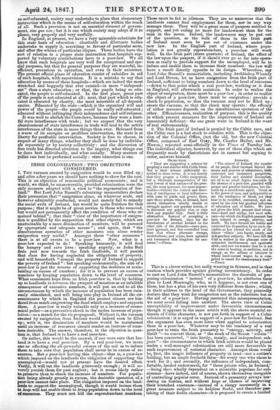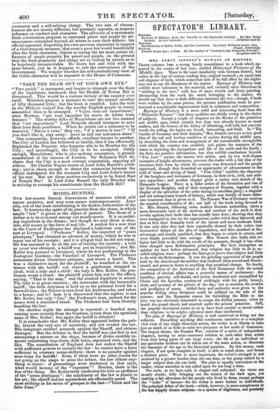HUSH COLONIZATION : TWO OBJECTIONS CONSIDERED.
r. TM: vacuum created by emigration would be soon filled up ; and after a few years we should have nothing to show for the cost. This is- an objection of reasonable political economists ; and it would, we think, be unanswerable, provided colonization were the only measure adopted with a view to "the regeneration of Ire- land." But Lord John Russell's colonizing memorialists declare their persuasion that " emigration alone, on whatever scale, and however admirably conducted, would not merely fail to remedy the social evils of Ireland, but would be quite fruitless for that purpose ; that it might be of great service to those who removed, but would not permanently affect the condition of those who re- mained behind ' ; that their " view of the importance of emigra- tion is qualified by the supposition that other objects, which are unattainable by a mere diminution of numbers, will be pursued by appropriate and adequate means " ; and again, that "the amiultaneous operation of other measures can alone render emigration very useful." Amongst these "other measures" there is at all events to be a poor-law. Now, what is a
poor-law expected to do Speaking humanely, it will feed the hungry and save lives : speaking angrily, as John' Bull feels just now towards the Irish landlords, it will punish that class for having neglected the obligations of property, and will henceforth " compel the property of Ireland to support the poverty of Ireland " : but speaking economically, the aim of a poor-law is just the reverse of supporting the destitute or main- taining an excess of numbers ; for it is to prevent an excess of numbers by keeping population down to the level of resources. What economists hope from an Irish poor-law is, that by holding up to landlords in terrorem the prospect of taxation as an infallible consequence of excessive numbers, it will put an end to all the circumstances by which the increase of population has been ruin- ously stimulated, and will bring into play in Ireland all the cir- cumstances by which in England the poorest classes are hin- dered from much outgrowing the fund which employs and supports them. A poor-law is really valuable only as a measure of econo- mical police—as a preventive check to the undue increase of popu- lation—as a match for the vie propagandi. Without it, the vacuum created by emigration from Ireland would indeed soon be filled up ; with it, the diminution of numbers would be maintained until an increase of resources should render an increase of num- bers desirable, The answer, therefore, to the objection in ques- tion is, that Ireland is to have a real poor-law. Or rather, this would be the answer, if one were sure that Ire- land is to have a real poor-law. By a real poor-law, we mean one so affecting the all-powerful owners of the soil as to induce them to take care that population shall never be in excess of re- sources. But a poor-law having this object—that is, a poor-law which imposed on the landlords the obligation of supporting the unemployed—would not at present have the desired effect. Verily, it will tax the landlords grievously enough ; it will se- verely punish them for past neglect ; but it seems likely rather to promote than to check the increase of numbers. For popula- tion being already greatly in excess, the desirable operation of a poor-law cannot take place. The obligation imposed on the land- lords to support the unemployed, though it would induce them to keep will not enable them to bring population down to the level of resources. They must not kill the superabundant numbers. taking of their feeble character—it is proposed to create a landed
These must be fed in idleness. They are so numerous that the landlords cannot find employment for them, nor in any way manage them. They will be a great mass of paupers entitled to support, and yet caring no more for landowners than for the man in the moon. Indeed, the landowners may be put out of the question, as the bulk of them in the Irish part of Ireland must soon be put out of existence under the new law. In the English part of Ireland, where popu- lation is not greatly superabundant, a poor-law will work well. In the Irish part (three quarters) ofeland, the effect of the law upon the paupers, if it should ever go so far into opera- tion as really to provide support for the unemployed, will be to induce and enable them to increase their numbers : the law will have a result directly opposite to its design. Wherefore, say. Lord John Russell's memorialists, including Archbishop Whately and Lord Devon, let us have emigration from the Irish part of Ireland, sufficient to bring numbers down to the level of resources —down to that point which a real poor-law, working as it does in England, will afterwards maintain. In order to realize the object of emigration, there must be a poor-law ; in order to realize the object of a poor-law, there must be emigration : provide a check to population, so that the vacuum may not be filled up ; create the vacuum, so that the check may operate : the efficacy of either measure depends on the simultaneous operation of the other. Efficaciousness, realization of purpose, this is the quality in which present measures for' the improvement of Ireland are lamentably deficient : the one great want in Ireland is the want' of real statesmanship.
2. The Irish part of Ireland is peopled by the Celtic race, and the Celtic race is a bad stock to colonize with. This is the objec- tion of the Colonial Office, (not the old, but the new Colonial Office, composed of Earl Grey, Mr. Charles Buller, and Mr. Irawes,) repeated semi-officially in the Times of Tuesday last. The individual objector, however, by one of those slips which are frequently made by rhetoricians not in earnest but arguing to order, answers himself.
This is a clever writer, but sadly wanting in fairness, and in that caution which provides against glaring inconsistency. In order to cast on Lord John Russell's memorialists the discredit of pro- posing colonization " instead" of a poor-law, he attributes their plan to Lord Monteagle, who, as it happens, is not even one of them, but has a plan of his own very different from theirs ; whilst, in their address to the head of the Government, they pointedly declare that they wish for emigration not as the substitute but ite the aid of a poor-law. Having corrected this misrepresentation, we must avoid falling into another. The above view of Celtic susceptibility of improvement under favourable circumstances, though it appears in the same article with the above scornful es- timate of Celtic character, is not put forth in support of a Celtic colonization : it is urged in support of a poor-law for Ireland. But the argument has even more force when applied to colonization than to a poor-law. Whatever may be the tendency. of a real poor-law to train the Irish peasantry to "energy, activity, and thrift "—to convert them, as " the stock of the Saxon ' " has been converted, " into hardy, manly, and independent sub- jects "—the circumstances in which Irish settlers would be placed under a well-managed colonization are still more favourable to such improvement of national character. Amongst them would be, first, the magic influence of property in land—not a cottier's holding,. but an ample freehold farm—for every one who chose to work for it ; and secondly, the influence of independent, com- fortable, landed endowment, for " those priests who, in Ireland," —being there wholly dependent on a miserable populace for sub- sistence—have indeed, and of course, shown themselves incapable of controlling popular error. Instead of a peasantry always bor- dering on famine, and without hope or chance of improving their wretched existence—instead of a clergy necessarily in, a great measure subject to its helpless flocks, and therefore par-
Ceanterrosr.
" They are suggesting- a scheme for peopling avast district with Celtic blood. Nor is their scheme sufficiently de- scribed in these terms. It is not merely that they propose a Celtic emigration, but a wholesale transportation of the very lowest of that nation-4)f the poor- est, the moat ignorant, the most im ticable—without the control and direc- tion of intelligence or local influence— with none to guide and govern them, save those priests who, in Ireland, have shown themselves utterly unable to struggle against any popular mania, or to denounce any popular vice, or cope with any popular folly. Such is their alternative. Instead of accepting a poor law for Ireland, they lay the foundations of another Ireland on the other side of the Atlantic—more poor, more ignorant, and less controlled even than that whose alternate wrongs, wretchedness, and crime, have agitated and tormented this kingdom for cen- turies."—Times.
ArrawErt.
" The misery of Ireland, the squalor of its people, their increase beyond the means and promise of subsistence, their contented and unshamed pauperism, their listless and slothful discomfort, are all in no small degree traceable to the absence of a poor-law, guarded with proper and prudent limitations, but dic- tated by a considerate spirit. Great as is the power of race, and indisputable as are the tendencies of blood, yet they bear to be modified, corrected, and oe• erced by the slow but gradual influence of education and of habits. We have not given the Irish .peasant that educa- tion—hard and trying, but most saln- tary—by.which the English peasant has been trained to energy, activity, and thrift. We have formed his habits and corrected his disposition by no such dis- cipline as has turned the stock of the Saxon ' villain ' into hardy, manly, and independent subjects. We have left the Celt to wallow in the pleasant mire of unheeded thriftlessness and apathetic sloth; and now we wonder that he is not the same in bearing, in ambition, and in energy, as the artisan or labourer to whose hard-earned wages he is com- pelled to resort for eleemosynary food I" —Times. yeomanry and a self-relying clergy. The two sets of circum- stances are not merely different, but precisely opposite, as respects influence on conduct and character. The advocate of a systematic Irish colonization proposes to surround priest and people by cir- cumstances calculated beyond all others to cure their defects : his official opponent, forgetting his own previous argument in support of a Government measure, that even a poor-law would beneficially alter the Irish character, objects to trying the far more potent in- fluences of ample property for priest and people, on the ground that the Irish peasantry and clergy are so vicious by nature as to be hopelessly unimprovable. He blows hot and cold with the same breath, just as it happens to suit the convenience of the Government. We wonder whether his self-contradictory view of the Celtic character will be repeated in the House of Commons.



























 Previous page
Previous page